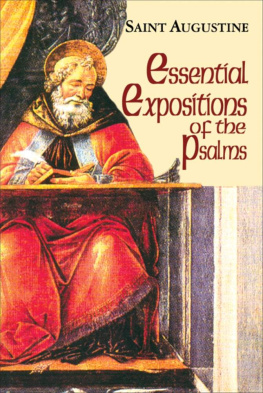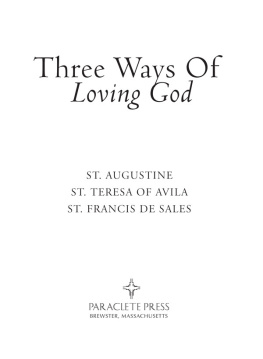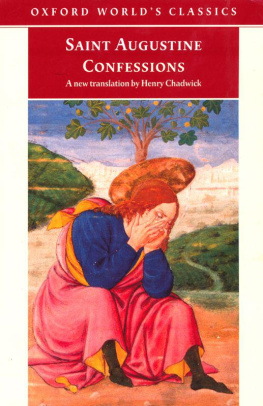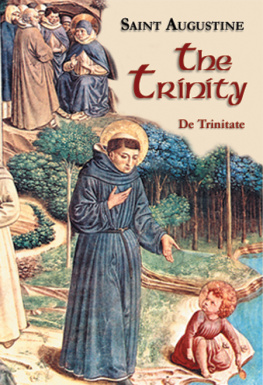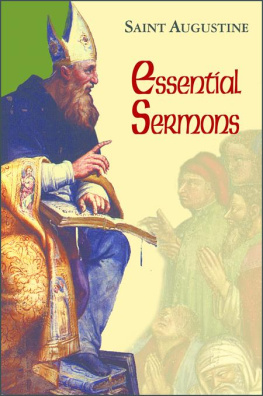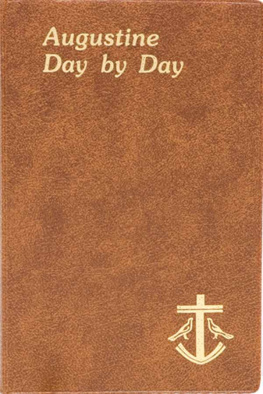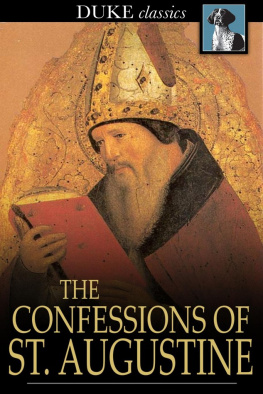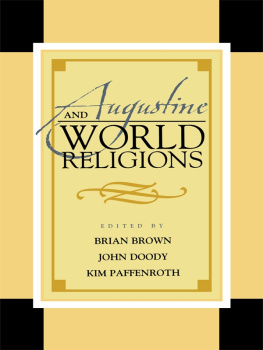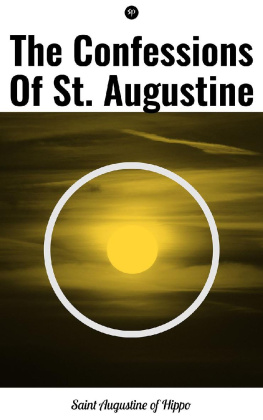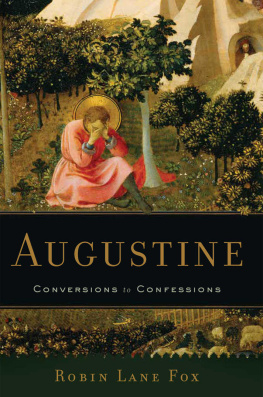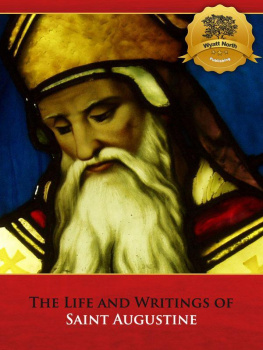Saint Augustine - The Confessions: Study Edition
Here you can read online Saint Augustine - The Confessions: Study Edition full text of the book (entire story) in english for free. Download pdf and epub, get meaning, cover and reviews about this ebook. year: 0, genre: Religion. Description of the work, (preface) as well as reviews are available. Best literature library LitArk.com created for fans of good reading and offers a wide selection of genres:
Romance novel
Science fiction
Adventure
Detective
Science
History
Home and family
Prose
Art
Politics
Computer
Non-fiction
Religion
Business
Children
Humor
Choose a favorite category and find really read worthwhile books. Enjoy immersion in the world of imagination, feel the emotions of the characters or learn something new for yourself, make an fascinating discovery.

- Book:The Confessions: Study Edition
- Author:
- Genre:
- Year:0
- Rating:5 / 5
- Favourites:Add to favourites
- Your mark:
- 100
- 1
- 2
- 3
- 4
- 5
The Confessions: Study Edition: summary, description and annotation
We offer to read an annotation, description, summary or preface (depends on what the author of the book "The Confessions: Study Edition" wrote himself). If you haven't found the necessary information about the book — write in the comments, we will try to find it.
The Confessions: Study Edition — read online for free the complete book (whole text) full work
Below is the text of the book, divided by pages. System saving the place of the last page read, allows you to conveniently read the book "The Confessions: Study Edition" online for free, without having to search again every time where you left off. Put a bookmark, and you can go to the page where you finished reading at any time.
Font size:
Interval:
Bookmark:

Augustinian Heritage Institute, Inc.
www.augustinianheritage.org
Board of Directors
+John E. Rotelle, O.S.A. (1939-2002), founding director
| Michael T. Dolan | Daniel E. Doyle, O.S.A. |
| Joseph T. Kelley | Patricia H. Lo |
| Thomas Martin, O.S.A. | Jane E. Merdinger |
Boniface Ramsey
Translation Advisory Board:
| Gerald Bonner | Maria Boulding, O.S.B. |
| Allan D. Fitzgerald, O.S.A. | Edmund Hill, O.P. |
| Joseph McGowan | Boniface Ramsey |
Roland J. Teske, S.J.
THE WORKS OF SAINT AUGUSTINE
A Translation for the 21st Century
Part I Books
Volume 1:
The Confessions
THE WORKS OF SAINT AUGUSTINE
A Translation for the 21st Century

I/1
introduction, translation and notes
Maria Boulding, O.S.B.
editor
John E. Rotelle, O.S.A.
New City Press
Hyde Park, New York
Published in the United States by New City Press
202 Cardinal Rd., Hyde Park, New York 12538
1997 Augustinian Heritage Institute
Translated by Maria Boulding, O.S.B.
Library of Congress Cataloging-in-Publication Data:
Augustine, Saint, Bishop of Hippo.
The works of Saint Augustine.
Augustinian Heritage Institute
Includes bibliographical references and indexes.
Contents: pt. 1., v. 1. The Confessions.
pt. 3., v. 1. Sermons on the Old Testament, 1-19.
pt. 3, v. 2. Sermons on the Old Testament, 20-50 [et al.] pt. 3, v. 10 Sermons on various subjects, 341-400.
1. Theology Early church, ca. 30-600. I. Hill,
Edmund. II. Rotelle, John E. III. Augustinian
Heritage Institute. IV. Title.
BR65.A5E53 1990 270.2 89-28878
ISBN 1-56548-055-4 (series)
ISBN 1-56548-083-X (pt. 1, v. 1)
ISBN 1-56548-084-8 (pt. 1, v. 1 : pbk.)
We are indebted to Brepols Publishers, Turnholt, Belgium, for their use of the Latin critical text for Sancti Augustini Confessionum Libri XIII, ed. Lucas Verheijen, O.S.A., Corpus Christianorum Latinorum 37 (Turnholt, 1990) 1-273.
Nihil Obstat: John E. Rotelle, O.S.A., S.T.L., Censor Deputatus
Imprimatur: + Patrick Sheridan, D.D., Vicar General
Archdiocese of New York, March 25, 1996
The Nihil Obstat and Imprimatur are official declarations that a book or pamphlet is free of doctrinal or moral error. No implication is contained therein that those who have granted the Nihil Obstat and Imprimatur agree with the contents, opinions or statements expressed.
1st printing: January 1997
9th printing: February 2008
Printed in the United States of America
Contents
Introduction
If the Bishop of Hippo looked out of his window as he picked up his pen, he saw a brilliant, colorful world, its hot details vivid in the fierce African sun. Augustine loved light, the queen of colors (X,34,51). He looked out at a prosperous Mediterranean country, at well-maintained roads gleaming white in the sun, at olive groves, orchards and vineyards, at municipal buildings and public baths. And everywhere was the stamp of Rome.
Augustines Africa was wholly different from the vast and varied continent suggested by that name today. To the south, beyond the Aures Mountains, it was cut off from the rest of the continent by the impassable Sahara. It was equally different from any North African country of medieval or modern times. The birth of Islam was more than two hundred years in the future, and the spread of Arab culture and language nearly three centuries away. Augustines Africa (the eastern part of Algeria and Tunisia today) was ancient Carthaginian country. Legend dated the foundation of Carthage to the ninth century B.C., and in succeeding centuries Phoenician sea-power and commerce had established trading ports along the Mediterranean coast. The Berber peasant farmers of the hinterland and the fishermen in the ports still spoke Punic, a Semitic tongue, in Augustines day. But after a disastrous series of clashes with Rome, Carthage had been subjugated in the second century B.C., and upon the ethnic substrate Rome had imposed the rule of law, Latin culture, and the amenities of civilized life. Augustines Africa faced north, across the tideless sea toward Italy.
Augustine picked up his pen, prayed to his God to enable him to say what he had to say, and began.
The Confessions are one long prayer, a poetic, passionate, intimate prayer. It is paradoxical, but exact, to say that he prayed for the grace to pray: Allow me to speak in your merciful presence (I,6,7); Let me not weary as I confess to you those acts of mercy by which you plucked me from all my evil ways (I,15,24); Let me love you, Lord, and give thanks to you and confess to your name (II,7,15); Let me confess my disgraceful deeds to you, and in confessing praise you. Allow me this, I beg you (IV,1,1); Accept the sacrifice of my confessions, offered to you by the power of this tongue of mine which you have fashioned and aroused to confess to your name (V,1,1).
He undertook this, his greatest piece of writing, in the conviction that God wanted him to make this confession: You first willed that I should confess to you, my Lord and my God (XI,1,1). In his heart, in his inner ear, he heard God asking it of him; but there were practical and human promptings as well. In 397, the most probable date for The Confessions, or at least for his beginning to write them, Augustine was forty-three. He had been a baptized Catholic for ten years, a priest for six, and a bishop for only about two. There were probably many in the church at Hippo, and more widely in the church throughout Numidia, who were less than convinced of their good fortune in acquiring so brilliant and distinguished a man for their bishop. Cleverness was, perhaps, not highly prized. His pre-baptismal life raised questions, especially his nine years adherence to the Manichean sect, and his polemical attitude toward the Catholic Church in earlier days. Was his conversion genuine? Finally, his elevation to the episcopate had itself been controversial, since the aged Bishop of Hippo, Valerius, had been in a hurry to snap Augustine up before any other church staked a claim, and had persuaded the Primate of Numidia to consecrate him coadjutor bishop with right of succession in canonically dubious fashion. Some kind of apologia pro vita sua from Augustines pen was therefore timely, and might disarm his critics. Insofar as The Confessions are polemical at all (which is not very far), the Manichees are in Augustines sights.
Beyond the critics was a wider circle of potential readers who would listen far more sympathetically. Augustine was not the only cultured and intelligent man to embrace Christianity at a mature age, after a long intellectual search. Paulinus of Nola was a kindred spirit; he and many others would be very interested in anything Augustine might have to say about his understanding of his faith and its relation to philosophy and the humanities. Many another had perhaps found in Neo-Platonism the highest and most spiritual achievement of the human mind in search of union with God, yet turned away disappointed, as Augustine had, because something was missing.
Finally there was the great company of Augustines fellow Christians who were neither critics nor philosophers, those who would overhear his confessions and judge in charity, whose charity would itself be the medium for understanding whatever he had to say: All whose ears are open to me by love will believe me (X,3,3); The charity that makes them good assures them that I am not lying (X,3,4). These would be encouraged and praise God, for it is cheering to good people to hear about the past evil deeds of those who are now freed from them (ibid.).
Next pageFont size:
Interval:
Bookmark:
Similar books «The Confessions: Study Edition»
Look at similar books to The Confessions: Study Edition. We have selected literature similar in name and meaning in the hope of providing readers with more options to find new, interesting, not yet read works.
Discussion, reviews of the book The Confessions: Study Edition and just readers' own opinions. Leave your comments, write what you think about the work, its meaning or the main characters. Specify what exactly you liked and what you didn't like, and why you think so.

